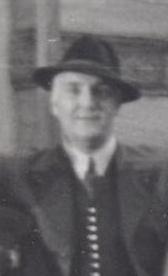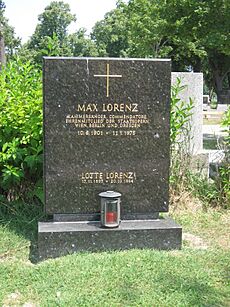Max Lorenz (tenor) facts for kids
Max Lorenz (born Max Sülzenfuß; 10 May 1901 – 11 January 1975) was a famous German opera singer. He was known as a heldentenor, which means he had a powerful voice perfect for heroic roles. He was especially famous for singing in operas by Richard Wagner.
Max Lorenz's Music Career
Max Lorenz was born in Düsseldorf, Germany. In the 1920s, he studied music in Berlin with Ernst Grenzebach. Later, he also learned from Estelle Liebling in New York City.
His first big performance was in 1927 at the Semperoper in Dresden. He quickly became a main singer there. From 1929 to 1944, he was a regular performer at the Berlin State Opera. He also sang in many other famous opera houses around the world. These included the New York Metropolitan Opera (1931–1934) and the Royal Opera House in London (1934 and 1937).
Lorenz was a frequent guest at the Bayreuth Festspielhaus, a special festival for Wagner's operas. He performed there from 1933 to 1939, and again in 1952 and 1954. He also sang at the Vienna State Opera for many years.
He performed at the Salzburg Festival too. After World War II, he even helped create new roles in modern operas. These included Der Prozess in 1953 and Penelope in 1954.
Max Lorenz's career as an opera and concert singer lasted for almost 30 years. He became one of the world's top heldentenors. He was especially well-known for his role as Tristan in the opera Tristan und Isolde.
In the 1930s and 1940s, Lorenz had a very strong and emotional voice. Many of his opera recordings are still available today. You can hear him live in a 1943 performance of Die Meistersinger from the Bayreuth Festival. He also sang in Götterdämmerung at Bayreuth in 1952. He was also famous for playing roles like Otello, Bacchus in Ariadne auf Naxos, and Herod in Salome.
Life During a Difficult Time
Max Lorenz married Charlotte (Lotte) Appel in 1932. She was from a Jewish family. During a challenging time in history, when the Nazi party was in power, his marriage faced difficulties.
Lorenz was very open about his marriage, which was not easy during this period. One time, when Lorenz was not home, a government group called the SS tried to arrest his wife and her mother. Luckily, Lotte Lorenz was able to call the sister of a powerful government official, Hermann Göring. The SS was then told to leave their home and not bother the women.
In 1943, Hermann Göring wrote a letter saying that Max Lorenz and his family were under his personal protection. This meant that no one should take action against Lorenz, his wife, or her mother. This protection helped them stay safe during a very difficult time.
Max Lorenz passed away in Salzburg. He is buried in the Zentralfriedhof in Vienna, Austria.
Famous Recordings
Max Lorenz made many recordings throughout his career. He often recorded songs from the operas of Richard Wagner and Richard Strauss. Some of his famous roles that were recorded include Tristan, Walther von Stolzing in Die Meistersinger von Nürnberg, Siegmund in Die Walkure, and Siegfried in Götterdämmerung. He also recorded as the Tenor/Bacchus in Ariadne auf Naxos.
See also
 In Spanish: Max Lorenz para niños
In Spanish: Max Lorenz para niños
 | Anna J. Cooper |
 | Mary McLeod Bethune |
 | Lillie Mae Bradford |



